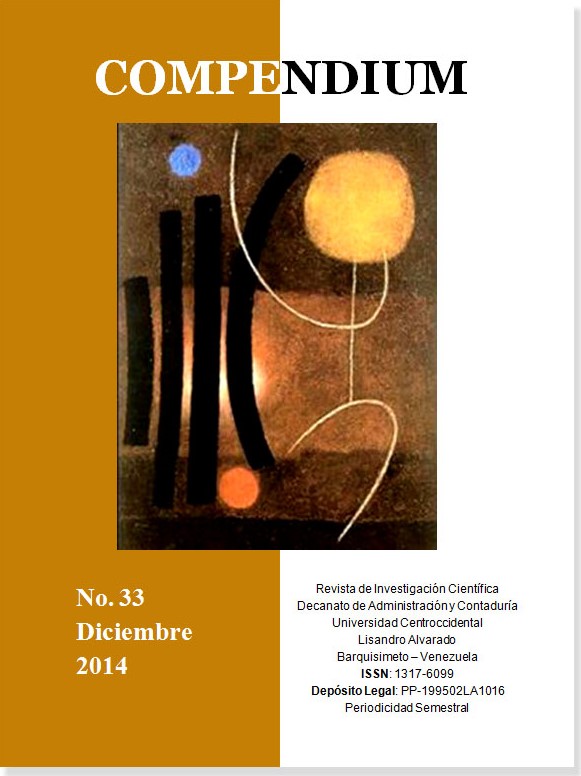Assessment by the students of the perceived quality of a graduate course administered by the e-learning modality
Keywords:
e-learning assessment, perception of quality, quality of e-learning, instructional design, instructional technologyAbstract
The aim of this study was to assess the quality of a graduate course from the student viewpoint and which is under e-learning modality. For the assessment, a model of internal criterium was made by the authors based on their own experiences as experts in virtual education and in line with the literature review on the topic of quality of e-learning in university education. The applied model focuses on the following components: (a) evaluation criteria (must be), represented by: instructional design, role of teachers, technology and organization; (b) the dynamics of the instructional process (what to do), which includes actions, interactions and transactions between the actors of the process during the development of projects, tasks and activities planned for the course; and (c) the prole of the student competence (being), according to the general course learning objective. An accessible sample to researchers was made of n= 17 subjects who responded to a self-administered, 40-item evaluation instrument. From 680 possible answers (40 for each one of the 17 participants), the results were: 32 answers (5%) perceived the course as Acceptable; 648 answers perceived it between Good (22%) and Excellent (74%). Taking into account the students’ perception, it is concluded that the course had a high level of quality.
Downloads
References
ACON M. ARIANA y AURORA TRUJILLO C. (2011). Evaluación de un curso en línea: Criterios de calidad. Revista CAES III Edición. Vol. II. No. 1. pp. 89-104. Fuente: web.uned.ac.cr/revistas/index.php/ caes/article/view/43 (Consultado el 3-10-14).
AGUILAR, RUTH (2005). Guía Didáctica: El material impreso en la educación a distancia. Universidad Técnica Particular de Loja. Ecuador.
CEBRIÁN, MANUEL (2003). Innovar con tecnologías aplicadas a la docencia universitaria. En: CEBRIÁN, MANUEL (Coord.) (2003). Enseñanza virtual para la innovación universitaria. NARCEA. Madrid. pp. 21-36.
CONDE VIDES, JUAN V; JORGE GARCÍA RODRÍGUEZ, DAVID GARCÍA LUNA, ALBERTO HERMIZ RAMÍREZ, ANA OSORIO NAVARRO, JUAN MORENO LÓPEZ y PABLO MUÑOZ SOLÍS (2013). Manual de Moodle 2.4 para el Profesor. Universidad Politécnica de Madrid –Gabinete de Tele-Educación. España. Fuente: serviciosgate. upm.es/docs/moodle/manual_ moodle_2.4.pdf (Consultado el 15-10-15).
KIRKPATRICK, DONALD (1999). Evaluación de acciones formativas: los cuatro niveles. EPISEGestión 2000. España.
LÓPEZ MENESES, ELOY y CRISTÓBAL BALLESTEROS R. (2011). Valoración didáctica de los cursos universitarios en red desde una perspectiva constructivista e investigadora. Revista Iberoamericana de Educación a Distancia. Vol. 14. No. 1. pp. 87-112. Fuente: ried.utpl.edu.ec/ images/pdfs/volumen141/ valoraciondidactica.pdf (Consultado el 29-09-14).
LUGO, MARÍA TERESA y VALERIA KELLY (2010). Tecnología en educación ¿Políticas para la innovación? UNESCO. París.
McARDLE, GERI (1999). Training Design and Delivery. American Society for Training and Development. USA.
MAURI, TERESA y JAVIER ONRUBIA (2008). El profesor en entornos virtuales: Condiciones, perfil competencias. En: COLL, CESAR y CARLES MONEREO (2008). Psicología de la educación virtual. Ediciones Morata. Madrid. España. pp.132-152.
MINISTERIO DE EDUCACIÓN NACIONAL (2013). Competencias TIC para el desarrollo profesional docente. Ocina de Innovación Educativa con Uso de Nuevas Tecnologías Colombia. Fuente: www.colombiaaprende.edu. co/html/micrositios/1752/ articles-318264_recurso_tic.pdf (Consultado el 4-10-14).
RUBIO, MARÍA JOSÉ (2007). Enfoques y modelos de evaluación del e-learning. Revista Electrónica de Investigación y Evaluación Educativa. Vol. 9. No. 2. Fuente: www.uv.es/relieve/v9n2/ RELIEVEv9n2_1.htm (Consultado el 3-10-14).
RUIZ BOLÍVAR, CARLOS y DÁVILA, ALIRIO (2014). Escala de Evaluación de la Percepción de la Calidad de un Curso Virtual (Versión Ruiz-Dávila). Informe no publicado. Barquisimeto. Venezuela.
RUIZ BOLÍVAR, CARLOS (2006a). Cómo llegar a ser un tutor competente. Santillana - UPEL. Caracas. Venezuela.
RUIZ BOLÍVAR, CARLOS (2006b). Escala de evaluación de la calidad de un curso virtual. Publicaciones UPEL. Barquisimeto. Venezuela.
SEOANE PARDO, ANTONIO MIGUEL y FRANCISCO GARCÍA PEÑALVO (2007). Criterios de calidad en formación continua basada en eLearning. Una propuesta metodológica de tutoría on-line. Materiales Instruccionales del curso TOL. Grupo de Investigación en interacción y e-Learning. Universidad de Salamanca. España.
UNITED NATIONS EDUCATIONAL, SCIENTIFIC AND CULTURAL ORGANIZATION (1997). La Educación Superior en el siglo XXI: Visión de América Latina y El Caribe.Tomos I y II.CRESALC/ UNESCO. Caracas. Venezuela.
VAN SLYKE, CRAIG, MARCY KITTNER y FRANCE BELANGER (1998). Identifying Candidates for Distance education: A telecommuting perspective. Proceedings of the America’s Conference on Information Systems. USA. pp. 666-668.
VILLAR, GRABIELA (2006). La evaluación de un curso virtual. Propuesta de un modelo. Universidad Nacional de General San Martín. Buenos Aires. Argentina. Fuente: www.oei.es/tic/ villar.pdf (Consultado el 28-09-14).
WEIS, CAROL H. (1972). Evaluation research: method for assessing program effectiveness. Englewood Cliffs - Prentice-Hall. Indonesia.




